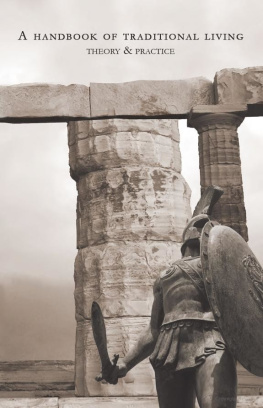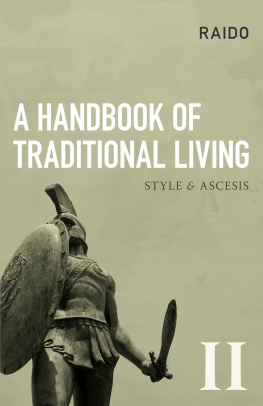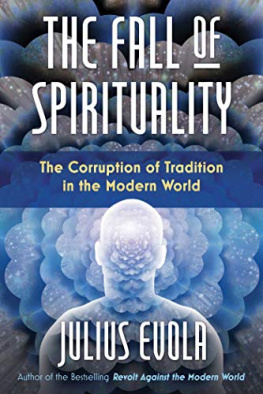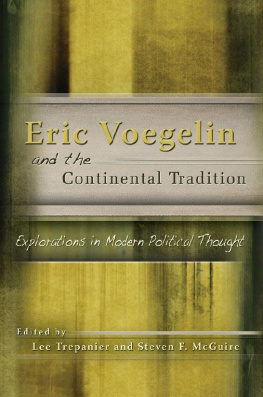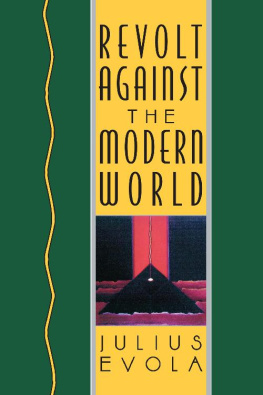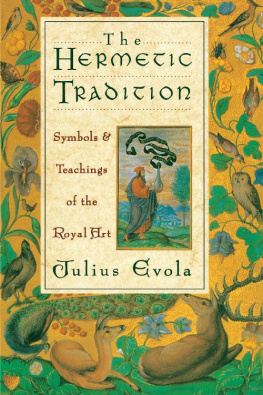A Handbook of Traditional Living
A
Handbook
of
Traditional Living
ARKTOS
Published in Italian as Il mondo della Tradizione and Unit operanti per il Fronte della Tradizione.
Originally published in 1997 and 1998, respectively, by Ass. Cult. Raido.
First Edition English edition 2010 published by
Arktos Media Ltd.
Translation Copyright 2010 by Arktos Media Ltd.
All rights reserved. No part of this book may be reproduced or utilised in any form or by any means (whether electronic or mechanical), including photocopying, recording or by any information storage and retrieval system, without permission in writing from the publisher.
Printed in the United Kingdom
isbn 978-1-907166-06-8
BIC classification: Philosophy of religion (HRAB); Revolutionary groups & movements (JPWQ)
Translated by S. K.
Edited by John B. Morgan
Book layout and typesetting by John B. Morgan
Cover design and artwork by Andreas Nilsson
ARKTOS MEDIA LTD
www.arktos.com
Table of Contents
TRANSLATORS FOREWORD
S.K.
The publication of the present booklet serves two complementary purposes: a) to present the reader with an accessible introduction to the world of Tradition; b) to offer ideal guidelines to those already active in the arena of revolutionary politics. Parts One and Two of this volume were originally published separately in Italy, under the titles of Il Mondo della Tradizione and Il Fronte della Tradizione.
Part One sets out to define Tradition as that eternal source of spiritual and normative values which infuses the lives of individuals and societies with meaning and dignity. Its authors touch upon the chief aspects of the traditional outlook: the notions of metaphysics, esotericism and initiation, caste and authority, cyclical decline and renewal. Traditionalist values are here set forth as a bulwark against the onslaught of profoundly disruptive forces:
The rejection of all injustices, lies and illusions gives rise to two fronts: if falsehood is the tool of Subversion, truth is the victorious weapon of Tradition. Truth is not a human product, but exists independently of individuals, whose duty it is to grasp it and realise it by means of action in the world.
That of action is the path advocated in this volume. The reader, therefore, should take note that the exposition of traditional doctrines it presents is closely tied to the personal equation of the authors, who have followed the legionary example in choosing as their motto Vita est militia super terram: Life is a soldiers service upon this earth.
Given its kshatriya inclination, Raido is not a writers guild but a base militante: a local community formed of individuals seeking to uphold the values of Tradition through active social and political engagement. When this writing was first published some ten years ago, it was primarily to educate the young political militants in the ranks of the Italian radical Right.
The approach to Tradition presented in this booklet, therefore, is unabashedly Evolian. There is nothing in these pages that Julius Evola would not have subscribed to and perhaps a few things that traditionalists of a different disposition might take issue with. This is particularly the case with the meta-historical narrative presented in 7 of Part One, which is almost entirely based on Revolt Against the Modern World.
Far from being a drawback, the Evolian twist of this work offers the reader who is new to the world of Tradition a concise introduction to the meta-historical vision of one of its great Twentieth century spokesmen. The Evolian direction of the first half of the volume also sets the pace for Part Two, where an attempt is made to relate the values of Tradition to the active fight against Subversion in contemporary society.
The reflections articulated in Part Two have their roots in decades of challenging political activism: in a desire to learn from past mistakes and make a clean break with sterile ideologies. The suggestions and models proposed by Raido, and inspired by the legionary example of the Rumanian Iron Guard, are applicable to all traditionally orientated communities. Yet, if the education of the political soldier remains
the most explicit aim of this work (originally issued as part of a series on The Formation of the Militant of Tradition), its teaching is far more broadly applicable: for the unfashionable notions it invokes of Loyalty, Love, Justice and Truth are as relevant to the life of the lone wolf as they are to that of the man of militia. The Front of Tradition, regardless of what external form it might take, is first and foremost an inner condition: a greater jihad to be waged at every moment against the enemies within.
For more information on Raido, which continues to publish books, distribute traditionalist material and organise conferences in Rome, visit the website www.raido.it.
A NOTE FROM THE EDITOR
JOHN B. MORGAN
All footnotes to the text, unless otherwise attributed, appeared in the original Italian editions. In some instances where quotations from other texts are used, I have used the relevant passages from existing translations. These are always cited in the accompanying footnotes. Wherever quotations are used I have attempted to provide a bibliographical citation if a citation is lacking, this means that I was unable to identify its source.
FROM THE PREFACE TO THE SECOND ITALIAN EDITION
We have received much encouragement in publishing this small yet essential piece of writing, which seeks not to be exhaustive, but rather to offer militants a chance for reflection.
The aim of this writing is to awaken an enthusiasm for Tradition among those of a similar disposition and to foster the kind of personal development capable of distancing militants from all forms of modern perversion. It is our firm belief that without a clear point of reference it is difficult to escape the vortex of decadence, which, in the long run, might end up devouring even those who are in principle opposed to the crisis of the modern world.
It is often the case that ones actions lack a clear direction; that a person lives his life from day to day, either enmeshed in the quicksand of barren intellectualism or a sacrificial victim to pointless agitation. The militant is thus either trapped in an ivory tower or ready to tackle any social issue in an attempt to prove himself up-to-date: in both cases, he remains unaware of the reality that surrounds him.
In Revolt Against the Modern World, Julius Evola argues that to leave the parameters of Tradition meant to leave the true life. To abandon the rites, alter or violate the laws or mix the castes corresponded to a regression from a structured universe (cosmos) back into chaos.
Tradition acts as a norm: as an internal and external law to be followed, particularly in moments of crisis such as the present one. As a measure and norm, Tradition must first of all shape our lifestyle and help us distinguish between friends and foes.
For this reason, traditional doctrine cannot be imposed: it can only be chosen freely in a conscious act of inner development. While a person may prove unworthy of his aspirations or fall before an obstacle, what matters is to be able to rise again and face difficulties with renewed determination.
Tradition is for the militant the necessary support to meet the challenges of everyday life. The militant must be clearheaded and conscious: respect for truth and justice, and Nature and its laws, will be the tangible signs of his connection to that transcendent Order which envelops the man in his entirety.
From Revolt Against the Modern World (Rochester: Inner Traditions, 1995), p. 55. (Ed.)

